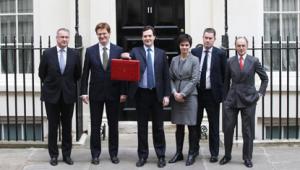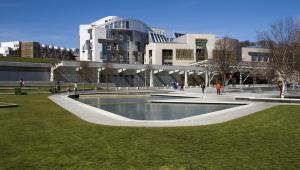Setting out the think-tank’s analysis of the chancellor’s statement, IFS director Paul Johnson said the delay was the result of a “gentler than planned path for spending cuts, including welfare”.
However, there has been no change in the total spending reduction envisaged by government to reach a surplus – which stands at a £37bn over the Parliament.
The Office for Budget Responsibility has now forecast the government will borrow £6.4bn in 2018/19, where previously it had predicted a surplus of £5.3bn. The Treasury is now projected to raise more than it spends in 2019/20, with a surplus of £10bn.
Analysing the figures, Johnson said the chancellor had found his promised £12bn in welfare spending cuts over four years, not the two initially planned.
“But he did announce measures which should reduce spending by £12bn by 2019/20,” said Johnson
“The biggest cut to tax credits was the reduction to the work allowances in Universal Credit. This represents an interesting choice: to focus cuts in the tax credit/universal credit system on families in work much more than those out of work.”
Overall, the Budget effectively meant “the long-term plan did change again”, said Johnson.
“In the March Budget, and indeed in the Conservative manifesto, we were promised budget balance by 2018/19. That magic moment has now been shifted back to 2019/20.”
However, the longer period to reach a surplus would still result in spending in unprotected departments being cut by about one-third in real terms between 2010/11 and 2019/20.
This was in part due to Osborne’s decision to confirm that the UK will always meet its NATO commitment to spend 2% of gross domestic product on defence, which had effectively added the department to the list of protected spending areas, along with the NHS, the school budget and overseas aid.
“The additional protection offered to defence spending and the pushing of some of the cuts into 2019/20 means that we still think that the peak to trough cut in real-terms spending on the remaining unprotected departments will be close to a third.
“We expect cuts to unprotected departments between 2015/16 and 2019/20 of around £19bn to be announced in the Spending Review in the autumn.”
Further restraint on public sector pay represented an important part of the plan, Johnson highlighted, and the 1% cap on increases for the next four years was likely to mean public sector pay levels well below their long-term average relative to pay in the private sector.
“This was well below anything seen since we can readily make comparisons back to the early 1990s,” he added.
“Up to now public sector pay restraint has merely served to match changes in the private sector. We are entering a new and much tougher phase.’
Measures in the Budget amounted to an overall tax increase of £6.5bn a year by 2020, but it was difficult to discern any clear sense of direction in tax policy, he added.
“So this Budget will lead to a lower welfare country as the chancellor promised. The figures are quite clear though – this was a tax-raising Budget, not quite consistent with the boast that it was aimed at a lower tax country.”





















